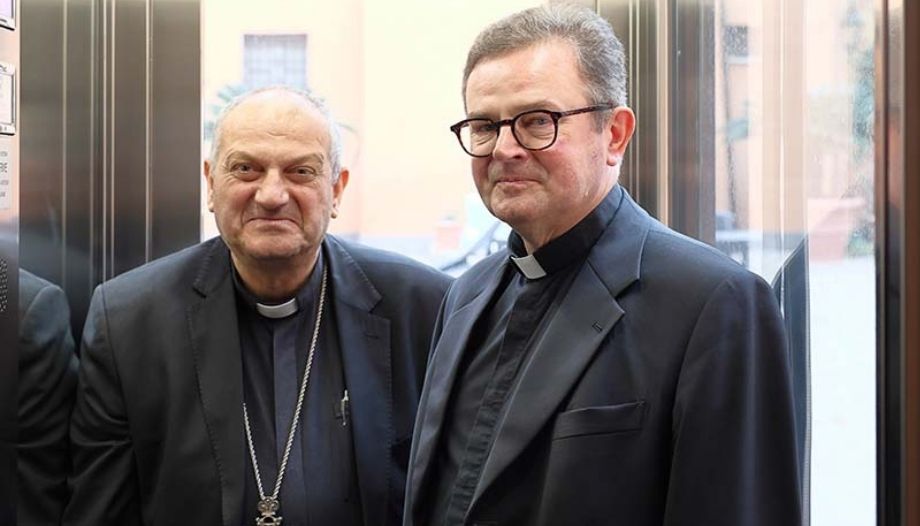- Junno Arocho Esteves, Malmoe (Sweden), OSV News
Archbishop Mourad of Homs, Syria, has noted that things have not changed for the better in Syria, not only for Christians, but for the entire population. "It's the same, nothing has changed," the Syrian archbishop told OSV News. "We should not listen to the official speeches of the current government, because they do not reflect the reality we live in on a daily basis."
In a telephone interview with OSV News, the Archbishop Mourad said that St. John Paul II's experience of living through World War II meant that he knew "well what war means, the evil and suffering it causes."
"For all of us, who live in a time of war that has not ended for 14 years, the teaching of the holy Pope John Paul II is, above all, a very important point of reference," he said.
Committed to interreligious dialogue
According to Msgr. Paweł Ptasznik, president According to the administrative council of the John Paul II Vatican Foundation, "the award was created to promote those persons and communities that carry out their activity inspired by the teaching and work" of the Polish pontiff.
Archbishop Mourad was chosen by the foundation's jury, "almost unanimously, even though we had about 20 candidates," Archbishop Ptasznik told OSV News Oct. 17.
"The situation in the Middle East in general, and the suffering that people have had to endure, made us think of Archbishop Mourad, who, on the one hand, is very committed to interreligious dialogue. And on the other, he does so inspired by the teachings and work of St. John Paul II," said Archbishop Ptasznik.
'He continues in this work'
"We chose Archbishop Mourad, who suffered for the dialogue between Christianity and Islam, and did not stop," he added. "He continues this work, which is not easy."
Prior to serving as Archbishop of Homs, Monsignor Mourad was a member of Deir Mar Musa, a monastic community restored in the 1990s by Jesuit Father Paolo Dall'Oglio.
Father Dall'Oglio was kidnapped in 2013 by Islamic State militants in Raqqa and allegedly killed.
Calling the late Italian Jesuit a "champion of dialogue in Syria," Archbishop Mourad told OSV News that the charism of the monastic community "was always to work through hospitality, to build the path of dialogue of peace and coexistence."
He dedicated his life "to this charisma".
"I have dedicated practically my entire monastic life to this charism, to this path," he said, noting the strong ties between Christians and Muslims, when he served as rector of the Mar Elian Church in Qaryatain, Syria.
Many Muslims who lived near the church, he recalled, came to pray before the relics of St. Elian (Julian), a Syrian martyr of the third century, "because for them this saint is also a saint, a wali (holy person). So they come to pray and ask for a blessing."
Those encounters, he continued, were an opportunity to get to know each other and build friendships, especially during the war, as he tried to help the wounded and those fleeing the conflict.
Recalling his three-month captivity, Archbishop Mourad said that during that time he "truly understood that the path of dialogue sustained by prayer is the only way, the only way...to achieve this peace."
A man of faith is "a man of peace".
"If I say I'm a man of faith, it means I'm a man of peace because we can't turn things against each other," he told OSV News.
"This point is very important because today, with the way fanatical Muslims who practice violence in the name of God act, they do not understand that this is not the God they worship. It is another God that they have constructed, that they have founded," he explained.
Because God - "the Merciful, the Clement," as we say in Arabic - is not a God who kills or tortures. In fact, during my kidnapping experience, I confronted him because they really changed their position just because I tried, in a simple way, to understand their violence, not to judge them. This is very important: not to judge each other.
Initial hopes for peace after Assad's overthrow
After former Syrian ruler Bashar Assad was overthrown, ending his family's 53-year rule, there were initial hopes for peace. Especially after Syria's interim president, Ahmend al-Sharaa, met with Catholic, Orthodox and Anglican leaders in the country in December 2024.
However, according to Archbishop Mourad, things have not changed for the better in Syria, not only for Christians, but for the entire population.
"It's the same, nothing has changed, it's like this," the Syrian archbishop told OSV News. "We should not listen to the official speeches of the current government, because they do not reflect the reality we live in on a daily basis."
"The violence, the corruption, the evil continues," he lamented.
—————————-
Junno Arocho Esteves writes for OSV News from Malmö, Sweden.
This information was originally published in OSV News, and can be found at here.
————————







